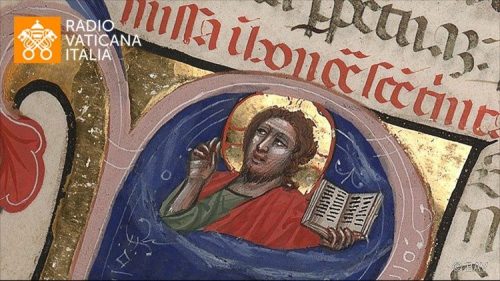READING OF THE DAY
A Reading from the Letter to the Hebrews
HEB 7:25—8:6
Jesus is always able to save those who approach God through him,
since he lives forever to make intercession for them.
It was fitting that we should have such a high priest:
holy, innocent, undefiled, separated from sinners,
higher than the heavens.
He has no need, as did the high priests,
to offer sacrifice day after day,
first for his own sins and then for those of the people;
he did that once for all when he offered himself.
For the law appoints men subject to weakness to be high priests,
but the word of the oath, which was taken after the law,
appoints a son, who has been made perfect forever.
The main point of what has been said is this:
we have such a high priest,
who has taken his seat at the right hand of the throne
of the Majesty in heaven, a minister of the sanctuary
and of the true tabernacle that the Lord, not man, set up.
Now every high priest is appointed to offer gifts and sacrifices;
thus the necessity for this one also to have something to offer.
If then he were on earth, he would not be a priest,
since there are those who offer gifts according to the law.
They worship in a copy and shadow of the heavenly sanctuary,
as Moses was warned when he was about to erect the tabernacle.
For God says, “See that you make everything
according to the pattern shown you on the mountain.”
Now he has obtained so much more excellent a ministry
as he is mediator of a better covenant,
enacted on better promises.
GOSPEL OF THE DAY
From the Gospel according to Mark
MK 3:7-12
Jesus withdrew toward the sea with his disciples.
A large number of people followed from Galilee and from Judea.
Hearing what he was doing,
a large number of people came to him also from Jerusalem,
from Idumea, from beyond the Jordan,
and from the neighborhood of Tyre and Sidon.
He told his disciples to have a boat ready for him because of the crowd,
so that they would not crush him.
He had cured many and, as a result, those who had diseases
were pressing upon him to touch him.
And whenever unclean spirits saw him they would fall down before him
and shout, “You are the Son of God.”
He warned them sternly not to make him known.
WORDS OF THE HOLY FATHER
The heart of every Christian is the site of a “struggle”. Each time the Father “draws us” toward Jesus, there is “someone else waging war with us”. Pope Francis highlighted this message in his homily at Santa Marta […]. Reflecting on the day’s Gospel passage (Mk 3:7-12), the Holy Father focused on the reasons that lead man to follow Jesus, and to examine how the following is never free of difficulty. Indeed if we do not fight temptations each day, we risk having simply a formal and ideological religion.
The Gospel passage, the Pontiff noted, makes repeated references to a ‘multitude’: “a great multitude followed Jesus from all over”. The people in “this crowd were throwing themselves at him, to touch him”. It was a crowd “warm with enthusiasm, which followed Jesus with warmth and came from all places: from Tyre and Sidon, from Idumea and from beyond the Jordan”. A great multitude “made this journey on foot to find the Lord”. And in facing the insistent crowd, one might ask: “Why did this multitude come? Why this enthusiasm? What did they need?”. The Pope suggested many motivations. “The Gospel itself tells us that there were sick people who sought to be healed” but there were also many people who came “to listen to him”. Indeed, “these people liked hearing Jesus, because he did not speak like their doctors”, but instead, “with authority”. Certainly, the Pope emphasized, “it was a multitude of people who came spontaneously: they weren’t brought on buses, like we have seen often when protests are organized and many have to go ‘to verify’ the presence, so as not to lose their job”.
These people “went because they felt something”. And they were so numerous “that Jesus had to ask for a boat and set out from the shore so that the crowd did not crush him”. But what was the real motive, the profound” motivation? The Pontiff said that “Jesus himself explains in the Gospel” this sort of “social phenomenon. He says: “No one can come to me if not drawn by the Father”. In fact, Francis clarified, whether this multitude went to Jesus out of “need” or because “some were curious”, the true reason is seen in the fact that “this crowd was drawn by the Father: it was the Father that drew the crowd to Jesus”. And Christ “was not indifferent, like a stagnant teacher who spoke his words and then washed his hands. No! This crowd touched Jesus’ heart”. We read in the Gospel that “Jesus was moved, because he saw these people as sheep without a shepherd”.
Therefore, the Pontiff explained, “the Father, through the Holy Spirit, draws people to Jesus”. It is useless to look for “all the reasoning”. Every reason can be “necessary” but “is not enough to make one finger move. You cannot move” or take “a step with only apologetic reasoning”. What is truly necessary and decisive, however, is “that the Father draws you to Jesus”.
The decisive point for the Pontiff’s reflection arrived when he examine the last two lines of the brief Gospel passage proposed for the day’s liturgy: “It is curious”, he noted, that while this passage “speaks about Jesus, speaks of the crowd, of the enthusiasm” and of the love with which “Jesus received and healed them”, there is also something extraordinary. It is written: “whenever the unclean spirits beheld him, they fell down before him and cried out, ‘Your are the Son of God’!”.
This, the Pope said, is precisely “the truth; this is the reality that every one of us feels when we approach Jesus” and what “the impure spirits try to impede; they wage war on us”.
Someone might object: “Father, I am very Catholic; I always to to Mass…. But I never have these temptations, thank God!”. But it isn’t so. The response is: “No! Pray, because you are on the wrong path!”, because “a Christian life without temptations is not Christian: it is ideological, it is gnostic, but it is not Christian”. In fact it happens that “when the Father draws people to Jesus, there is another who draws in the opposite way and wages war within you!”. Thus Saint Paul “speaks of Christian life as a struggle: a struggle every day to win, to destroy Satan’s empire, the empire of evil”. This is the reason, the Pope added, that “Jesus came, to destroy Satan! To destroy his influence on our hearts”.
This final notation in the Gospel passage highlights what is essential: “both Jesus and the crowd” seem to disappear, leaving “only the Father and the impure spirits, that is the spirit of evil. The Father who draws the people to Jesus and the evil spirit who tries to destroy, always!”.
In this way we understand that “Christian life is a struggle” in which “either you let yourself be drawn to Jesus, through the Father, or you can say ‘I’m tranquil, at peace’…. But in the hands of this multitude, of these impure spirits”. However, “if you want to go forward you must fight! Feel the heart struggling, so that Jesus may win”.
Therefore, all Christians must make this examination of conscience and ask themselves: “Do I feel this struggle in my heart?”. This conflict “between comfort or service to others, between having a little fun or praying and adoring the Father, between one thing and the other?”. Do I feel “the will to do good” or is there “something that stops me, turns me into an ascetic?”. And also, “do I believe that my life moves Jesus’ heart? If I don’t believe this”, the Pope warned, “I must pray a lot to believe it, so that he may grant me this grace”.
(Santa Marta, 19 January 2017)

